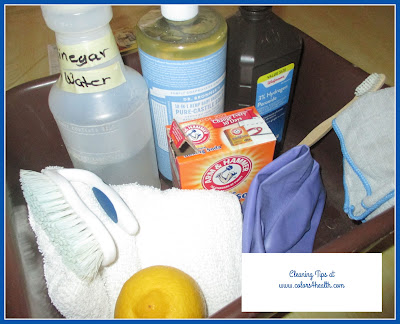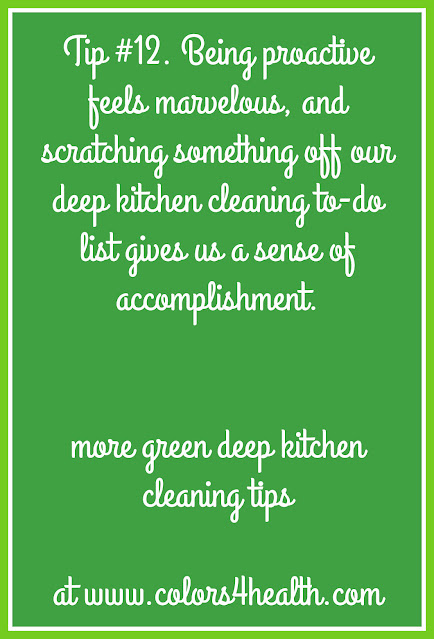The kitchen is the heart of most homes. It can be a more healthful and cleaner space, if we learn to make deep kitchen cleaning greener and more mindful.
In addition to daily and weekly kitchen cleaning chores, spring and fall are ideal times to deep-clean kitchen appliances, cabinets, windows, blinds or other
window coverings, pantry, fixtures, walls, counters, and floors.
Temperatures are usually more moderate in these seasons, and cleaning tasks are pleasant to do, when we're not sweating or chilled.
Twice-a-year deep kitchen cleaning helps us freshen this important room of our abode, and put it into tip-top shape.
Let's fling open the windows and let the kitchen cleaning process begin.
Keep on reading for
Tips to Make Deep Kitchen Cleaning
Green and
Health Enhancing
Tip #1. Instead of using commercial cleaning products including Pledge and Windex that have been found to be contaminants in waterways as well as endocrine disruptors, let's streamline cleaning supplies to more healthful, eco-friendly ones.
Making homemade kitchen cleaning products keeps home maintenance costs down, uses environmentally green ingredients, and contributes to a sustainable lifestyle.
DIY Cleaning, clockwise from left front: whole lemon, scrub brush, white cloth, spray bottle with vinegar and water, liquid soap, hydrogen peroxide, tooth brush, micro-fiber cloth, purple rubber gloves, center: baking soda. All fit into a bin for easy handling and storage.
white vinegar
baking soda
fresh lemon ( lemon cleaning ideas below)
liquid dish soap (unscented)
water
hydrogen peroxide
scrub brushes, toothbrushes, reusable rubber gloves, and micro fiber cloths or rags
Tip #2. Read Eco-friendly Tips and Tricks for Cleaning Your Home. Learn which methods are favored by cleaning pros.
Tip #3. Don colorful reusable rubber gloves to protect skin and nails for all cleaning, and wear comfortable clothing to help you feel relaxed as you work.
Tip #4. Encourage housemates, friends, and or/family to join in. Notice how teaming up with a cleaning squad can prove to be more enjoyable and productive than working alone.
Tip #5. It's best to test a new housecleaning product on an inconspicuous spot, before using it on a larger area.
Tip #6. Most cleaning experts advise us to start from the top and work down. Dust and remove cob webs and dirt from the ceiling and light fixtures first.
Save time, energy, and avoid aches and pains from over-stretching, by using a long handled brush to reach high and low places.
If you dampen the brush with a few drops of water or one of the homemade cleaning solutions mentioned in this post, more dust will adhere to the brush than if it's dry.
After each cleaning job, clean the brush.
Tip #7. To clean a ceiling fan: Slide brush along each fan blade, and voilà, the fan is dusted.
A vacuum cleaner can complete this task and here are the particulars.
The third way to clean a ceiling fan is to use an old pillow case as a dust catcher. Slide the case over each individual fan blade. Use hands to press on both sides of the fan blade while sliding the pillow case off.
Simply invert the pillow case and shake debris or dust into a trash can. To finish, clean the pillow case by throwing it in the wash inside out.
Tip #8. If we lose interest and need extra motivation, select whatever kitchen area is the worst eye sore or germ collector. Tackle that now.
This is a creative way to nip procrastination in the bud, and provides incentive to move full steam ahead.
Tip #9. Think small. If the catch-all junk drawer is overflowing, the dust on top of the refrigerator is an inch thick, or the sink or food disposal drain is so smelly we gag, perhaps it's best to start there.
Tip #10. Set a timer, and focus on one thing for 10 minutes. Then move on to the next mess, one area at a time.
Tip #11. Put the contents of a cabinet or drawer on the counter, and remove those items that
are never used by donating, recycling, or giving them away.
While the drawer or cabinet is empty, clean the item itself and the shelving paper. Use this technique for the pantry and refrigerator (dispose of spoiled or outdated foods as well).
Put back only those small appliances, pots and pans, dishes, cooking utensils, or food that we definitely use.
Weeding out the "unused" creates storage space
for those essential everyday items most of us had previously placed on countertops, crowded in, or stacked somewhere else.
Whenever we clear clutter to make white space, we lighten the atmosphere and free energy for new recipes, ideas, people, and opportunities.
Tip #12. Being proactive feels marvelous, and scratching something off our deep kitchen cleaning to-do list gives us a sense of accomplishment.
To prevent kitchen cleaning overwhelm, continue to think small and do one job at a time.
Tip #13. A DIY cleaning product I love is fresh lemon/lemon juice. Cut a fresh lemon in half, and rub it on stained laminate countertops, cutting boards, and the like. It whitens objects naturally and removes grease.
Use lemon to remove lime scale from
your faucet and sink, and make glassware shine.
Fresh lemons are safe, pleasant smelling cleaning agents, and the citric acid in lemon acts as a natural antibacterial bleach.
Just a word of caution: when cleaning granite do not use lemon, vinegar, or anything acidic. Acidic cleaners erode the finish and wear down the stone. Follow manufacturers' directions for cleaning granite.
Tip #14. Essential oils including thyme, cinnamon, clove, rosemary, and tea tree oil tend to destroy several
bacterial, fungal, and viral pathogens.
These essential oils have earthy scents rather than a floral or citrus fragrance. We may want to add a few drops of essential oil into an all- purpose cleaner to sanitize as we go.
If you like a citrus scent, use lemon, grapefruit, or orange essential oil in a diffuser to freshen unwelcome odors in the air, instead of commercial air fresheners.
Tip #15. Wipe down walls with one of these homemade cleaning solutions. For pantry door, backsplashes, cupboards, table and chairs, and window frames, either spray product then rinse or use a cloth to apply and rinse.
Tip #16. It's best to read manufacturers' instructions for cleaning kitchen appliances. Save user manuals and refer to them before turning on a self-cleaning oven control, the cleaning cycle of the dishwasher, food disposal unit, etc.
If an appliance breaks down and can't be fixed, replace it with an energy efficient one. This makes sense for the environment and saves money in the long run.
Tip #17. Vinegar and water is a mixture that makes an awesome window cleaner. Fill an empty spray bottle with a combo of one part white vinegar to 3 parts water. Use a microfiber cloth to wipe down your windows, laminate counter tops, and most appliances.
Tip #18. Tile floors need a thorough going over at least twice a year. Here's the method I recommend.
Vacuum or sweep floor. Then make a paste of 1/2 cup baking soda and 1/4 vinegar to scrub those missed areas that have crevices and cracks (spots you may have overlooked during a regular weekly cleaning).
Then use a clean mop and fill a bucket with hot water, a half cup of vinegar, and half a teaspoon of dish soap. Don't use too much soap, because a soapy residue can make floors look dull or be slippery. This mixture does wonders on laminate floors as well.
Tip #19. We mustn't forget to inspect and/or install and maintain smoke detectors and carbon monoxide monitors. Safe, clean air is a must for good health.

When we are consistent with daily and weekly cleaning chores, we'll find deep kitchen cleaning the kitchen easier.
If we forget to wipe up spills as soon as they happen, cook fried foods and don't clean grease or oil up, or have a cluttered kitchen, we'll have more to do during a deep cleaning.
No matter how often we clean our kitchen, it pays off to deep clean the kitchen twice a year.
The additional care and time spent when deep cleaning assures even those areas that may have been missed during a regular cleaning, are covered.
When we rid our kitchen of toxic chemicals and sanitize cutting boards, counters, the sink, and the like with non-toxic products, our kitchen will be a safer space to prepare and eat food.
Be kind to our planet and health of adults,
children, and pets alike by using green cleaning products spring, summer, winter, and fall. This is an important step in enhancing total well-being.
Have you ever compared the cost of commercial kitchen cleaning products with ones made at home? Please share about it in the comments section below.
What cleaning job do you resist the most or enjoy doing the most and why?
I read and appreciate every comment, but will not post those with links in them. Thanks for understanding.
This post has been shared at Tea-time-tour-and-wonderful-Wednesday-Blog- Hop
This post has been shared
at Happiness is Homemade 422
This post has been shared at Thursday-favorite-things-535
This post has been shared at all-about-home-link-party-138
This post has been shared at April edition of The Hearth and Soul Link Party!
This post has been shared at Dare -to-share-513













